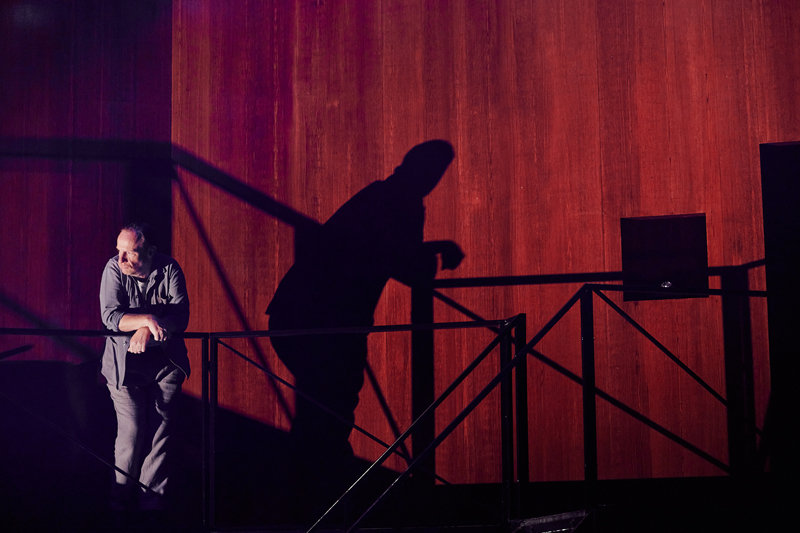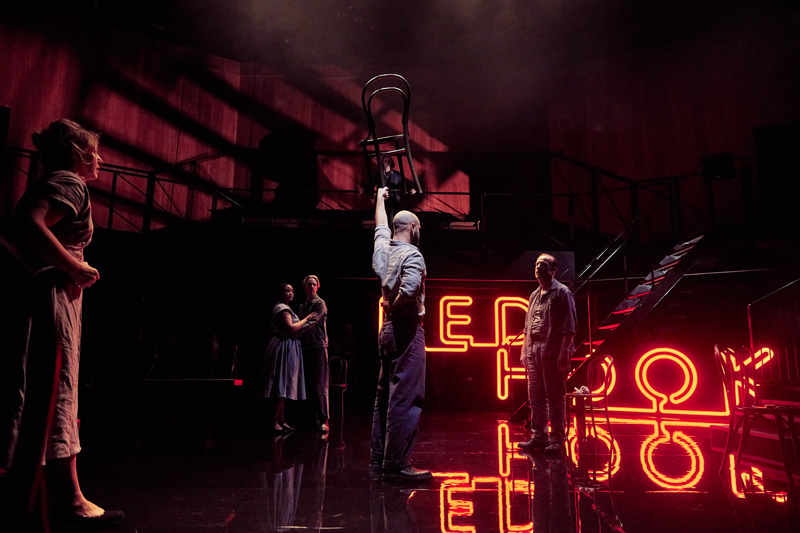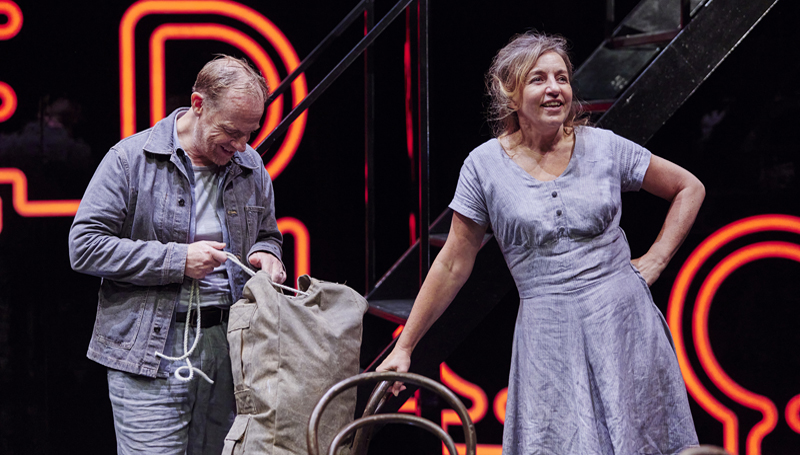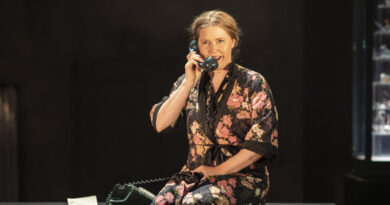“A View from the Bridge”, Chichester Festival Theatre
Jeremy Malies in West Sussex
13 October 2023
“It wasn’t as if there was any mystery to unravel” is one of lawyer Alfieri’s closing lines in Arthur Miller’s exquisite memory play A View from the Bridge. I often wonder if this is ironic but didn’t need to dwell on it here in an unsubtle production that gave up its few secrets immediately.

Jonathan Slinger as Eddie.
Photo credit: The Other Richard.
Alfieri is played here by The Crown actor Nancy Crane. She and director Holly Race Roughan seem to have missed the point that while in her narrator role the character is a ghost and should have an ethereal quality. It is this that separates her from the other characters as she punctuates the action with elegiac monologues. Crane is strident in her projection, over-emphasizes the meaning of anything figurative in her lines, and does nothing to fuse an ethnic community of dock labourers near Brooklyn Bridge with the broader background of Manhattan which is a core (unambiguous) function of her role as written.
Always concerned with authenticity, Miller insisted on working shifts as a longshoreman while writing a film script about corruption in the New York docks. For the same project, he later travelled to Italy and studied how migrant labourers in the United States supported their families back home. All of this is in the text of the play.
Of course, Race Roughan is entitled to create a revisionist version with a broad brush. I just wish she could have done it with more flair and insight while also avoiding a general atmosphere of sloppiness that extended to the cod Italian accents (voice and dialect coach Aundrea Fudge) with the actors using attenuated vowel endings, syllabizing everything, and almost taking a run-up before their rolled ‘r’s. Miller (though not known to be protective about his work) would surely have disliked all this “tawking”.

Jonathan Slinger as Eddie.
Photo credit: The Other Richard.
The problems don’t stop here. In the lead role of longshoreman Eddie Carbone, Jonathan Slinger seldom simmers as he should but instead jerks his way through a plot that sees him conceive homosexual feelings for his lodger and incestuous ones for his niece. I don’t need him to be dodging phantom punches as failed boxers often do but expect Slinger and fight director Kevin McCurdy to make a credible scene of the action where he spars with his wife’s Italian cousin Rodolpho played by Luke Newberry.
Better versions of Eddie strike me as being nonplussed. (“It’s like a shooting gallery in here and I’m the pigeon.”) Slinger seldom grasps the weaknesses and complexities of the role. There is no sense of him struggling against the impending act of betrayal (snitching to immigration) and the lust for his niece. Was this really the actor I saw excel as Judge Azdak in The Caucasian Chalk Circle a year ago?
Newberry emerges with credit, bringing a level of effeteness to Rodolpho such that he excites suspicion among the stevedores at the harbour but is still a convincing love interest for Rachelle Diedericks as Catherine. Diedericks is the star of the evening with an innocent sensuality that can be stimulated by the merest glance from Newberry. She has been a caged bird but a spirited one who is about to take flight. Despite the sombre ending, you can be hopeful that she and Rodolpho have a future whether it be in the United States or Italy which is her preference.
As Marco, the elder cousin, Tommy Sim’aan impresses in the full-on fight with Slinger. His physicality convinces us that elements of tribalism have been imported from Sicily and he smoulders while in detention for immigration crimes. Sim’aan commands attention when telling Alfieri that “All the law is not in a book” and adds colour when describing fishing trips from Sicily to Africa and Yugoslavia.
Playing Carbone’s wife Beatrice, Kirsty Bushell has little to spark off, her one important moment coming in a strong exchange with her husband about why their marriage has been sexless for many months. Here, Slinger does manage to hint at his feelings for Rodolpho. But the married couple are miscast and seldom suggest any backstory. There is simply not enough human wretchedness here with the sweat and squalor being lost in the broad sweep of Race Roughan’s approach.
I had no sense that Brooklyn is “the gutter to New York” and, if anything, the neighbourhood of Red Hook appeared prosperous. There should be a sense of the destructive power of water and immigrants getting dammed up such that floodgates are about to give. A gargantuan Art Deco sign predominates and suggests a nightclub when it should be indicating a community. The sign gives off a warm red hue which lighting designer Alex Fernandes accentuates with filters.
The raised thrust stage is a mass of polished black with the two-tier playing area designed by Moi Tran featuring a gantry on which actors await their entrances. The upper area is a mass of burnished wood against which Fernandes casts shadows which I took to be the spans of Brooklyn Bridge. Most designs for the play hint at the teeming activity outside the apartment but Tran and Race Roughan keep everything uncluttered with hardly a prop. There is one brilliant touch in the form of a swing which shows how Eddie has infantilized Catherine.
I question Race Roughan’s decision to have the backdrop lacking in specifics when Eddie is so fond of sounding off about his place in the community. There is little context here. Original music is by Max Perryment who composed for Jitney at the Old Vic and here injects big unabashedly romantic Puccini-like aria snippets which hurtle matters to their tragic conclusion.
I thought wrongly that this play was durable and robust enough to withstand any kind of approach and thematic treatment. Topics of economic hardship, domestic violence, and inappropriate sexual contact will not lose their relevance anytime soon. And with people-trafficking making headlines, you would think that immigration and an associated racket might have more traction. I’m accustomed to a mesmeric intensity in productions of this amazing play and left disheartened.









